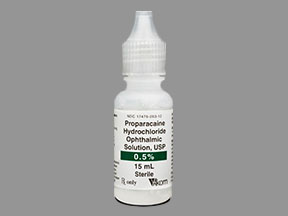
Proparacaine Coupons & Savings Card – Discount Prices from $17.42
Generic for: Alcaine
My prescription
Edit
15ML of 0.5%, Proparacaine (1 Bottle)
Select pharmacy

CVS
$20.39
COUPON PRICE
Walgreens
$17.42
COUPON PRICE
Walmart
$28.70
COUPON PRICE
Albertsons
$34.51
COUPON PRICEProparacaine savings card
Show this card to your pharmacist
Walgreens
$17.42
BIN
ID
PCN
GRP
011867
LHD0BE49D6
HT
LABH001
Powered by
Price history for Alcaine (brand) & Proparacaine (generic)
1 Bottle, 15ML of 0.5%
Average retail price for Alcaine
Average retail price for Proparacaine
Average SaveHealth price for Proparacaine
Our price history data is based on aggregated prescription data collected from participating pharmacies in America. Our prescription data updates daily to reflect the latest price changes. If you notice a missing data point, it means there wasn't sufficient data available to generate a monetary value for that date.
We analyzed Proparacaine prices for (15ML of 0.5%, 1 Bottle) over the last 12 months. The average retail price was $102.35, while the average price using the SaveHealth discount card was $30.76. That's a savings of approximately 69.95% when using our Proparacaine coupon.
Compared to the generic version, Alcaine had an average price of $66.99 over the same time period. With the SaveHealth savings card, Proparacaine is 54.08% cheaper on average than Alcaine.
*Retail prices are based on pharmacy claims data, and may not be accurate when we don't have enough claims.
Proparacaine dosage forms
Dosage Quantity Price from Per unit 1GM 1 Bottle $217.11 $217.11 1GM 2 Bottles $453.21 $226.60 1GM 3 Bottles $689.32 $229.77 15ML of 0.5% 1 Bottle $20.39 $20.39 15ML of 0.5% 2 Bottles $22.48 $11.24 15ML of 0.5% 3 Bottles $32.57 $10.86
| Dosage | Quantity | Price from | Per unit |
|---|---|---|---|
| 1GM | 1 Bottle | $217.11 | $217.11 |
| 1GM | 2 Bottles | $453.21 | $226.60 |
| 1GM | 3 Bottles | $689.32 | $229.77 |
| 15ML of 0.5% | 1 Bottle | $20.39 | $20.39 |
| 15ML of 0.5% | 2 Bottles | $22.48 | $11.24 |
| 15ML of 0.5% | 3 Bottles | $32.57 | $10.86 |
